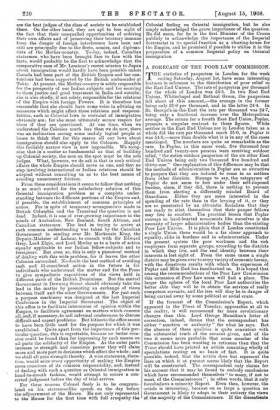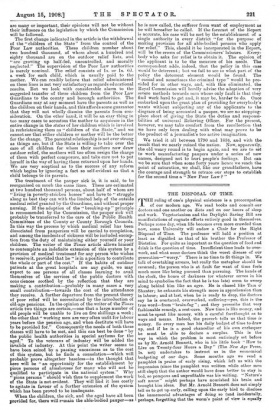A FORECAST OF THE POOR LAW COMMISSION.
THE statistics of pauperism in London for the week ending Saturday, August 1st, have some interesting features in reference to the distribution of poor relief in the East End Unions. The rate of pauperism per thousand for the whole of London was 24.5. In two East End Unions, Whitechapel and Bethnal Green, the pauperism fell short of this amount,—the average in the former being only 21-0 per thousand, and in the latter 24.4. In St. George's-in-the-East the rate per thousand was 24.7, being only a fractional increase over the Metropolitan average. The return for a fourth East End Union, Poplar, presents a singular contrast to these figures. While neither in the East End Unions nor in London taken as a whole did the rate per thousand reach 25.0, in Poplar it was 54-8,—more than double what it is in any of the cases mentioned. The numbers are quite as remarkable as the rate. In Poplar, in this same week, five thousand four hundred and twenty-one persons were receiving outdoor. relief, "the entire outdoor pauperism of the six other East End Unions being only two thousand five hundred and thirty-one." One explanation of this difference may be that the methods of administration in Poplar are so attractive to paupers that they are induced to come in as settlers from other districts. Strange to say, the ratepayers of Poplar do not seem to fret under their self-imposed burden, since, if they did, there is nothing to prevent them from electing a differently minded Board of Guardians. Either they are more interested in the spending of the rate than in the levying of it, or they are so penetrated by an altruistic Socialism that they are ready to stint themselves that their pauper fellows may live in comfort. The practical lesson that Poplar conveys to bard-hearted economists like ourselves is the necessity of larger administrative bodies than the existing Poor Law Unions. It is plain that if London constituted a single Union there would be a far closer approach to equality, alike in burdens and in administration. Under the present system the poor workmen and the rich employers form separate groups, according to the districts in which they live, and the real identity between their interests is lost sight of. From the same cause a single district may be given over to every variety of economic heresy, with the disastrous results with which the experience of Poplar and Mile End has familiarised us. It is hoped that among the recommendations of the Poor Law Commission this extension of Poor Law areas will find a place. The larger the sphere of the local Poor Law authorities the better able they will be to obtain the services of really competent servants, and the less will they be in danger of being carried away by some political or social craze.
If the forecast of the Commission's Report, which appeared in the Times of Tuesday, approaches at all to the reality, it will recommend far more revolutionary changes than this. Lord George Hamilton's letter of correction, indeed, denies that the correspondent has either "sanction or authority" for what be says. But the absence of these qualities is quite consistent with the substantial truth of the account given, and of the two it seems more probable that some member of the Commission has beeu wanting in reticence than that the Times should have printed an article consisting wholly of speculations resting on no basis of fact. It is quite possible, indeed, that the article does but represent the lines on which it at present seems likely that the Report will be constructed. The correspondent only claims for his account that it may be found to embody conclusions which have recommended themselves " to many, if not to most, of the Commissioners " ; in other words, that it only foreshadows a minority Report. Even then, however, the article is interesting, because on so large a question no Government is likely to adopt in their entirety the views of the majority of the Commissioners. If the dissentients are many or important, their opinions will not be without their influence on the legislation by which the Commission will be followed.
The first change indicated in the article is the withdrawal of the "children of the State" from the control of the Poor Law authorities. These children number about two hundred thousand, of whom about a hundred and eighty thousand are on the outdoor relief lists, and "are growing up half-fed, uncontrolled, and morally neglected." The supervision of the Poor Law authorities is merely nominal. The relief consists of is. or is. 6d. a week for each child, which is usually paid to the mother. We can readily believe that relief administered on these lines is not very satisfactory as regards educational results. But we look with considerable alarm to the suggested transfer of these children from the Poor Law Guardians to the county and borough authorities. The Guardians may at any moment have the parents as well as the children on their hands, and this affords some guarantee that they will not wholly dismiss the parents from con- sideration. On the other hand, it will be an easy thing in too many cases to accustom the mother to acquiesce in the entire chancre in the status of her children which is involved in rechristening them as "children of the State," and we cannot see that either children or mother will be the better for the change. The parental relationship is not over strong as things are, but if the State is willing to take over the care of all children for whom their mothers now draw outdoor relief, the mothers will too often resign the charge of them with perfect composure, and take care not to put herself in the way of having them returned upon her hands. We are very sceptical as to the success of any reform which begins by ignoring a fact so self-evident as that a child belongs to its parents.
The treatment of the pauper sick is, it is said, to be reorganised on much the same lines. These are estimated at two hundred thousand persons, about half of whom are "living in poverty-stricken homes" and have to "struggle along as best they can with the limited help of the outside medical relief granted by the Guardians, and without proper nursing. If the adoption of the " breaking-up " principle is recommended by the Commission, the pauper sick will probably be transferred to the care of the Public Health Committees of the County or County Borough Councils. In this way the process by which medical relief has been dissociated from pauperism will be carried to completion, and among the incidents of sickness will be included exemp- tion from the duty of maintaining either yourself or your children. The writer of the Times article allows himself to contemplate an indefinite extension of this system by a provision of medical treatment for any person who wishes to receive it, provided that he "is in a position to contribute the whole or part of the cost." If the habits of outdoor patients at the great hospitals are any guide, we may expect to see persons of all classes learning to avail themselves of the services of the public doctors with cons ciences soothed by the reflection that they are making a contribution—probably in many cases a very small contribution—towards the cost of the attendance they receive. A further departure from the present theory of poor relief will be necessitated by the introduction of old-age pensions. In the opinion of the writer of the Times article two things are certain,—one that a large number of old people will be unable to live on five shillings a week ; the other that "working men are very often unfit for labour years before the pension age, and when destitute will have to be provided for.' Consequently the needs of both these classes will have to be met, and this can best be done "by the public health authorities in special asylums for the aged." To the veterans of industry will be added the invalids of industry. At this point the writer seems to have been seized by a passing uneasiness as to the cost of this system, but he finds a consolation—which will probably prove altogether baseless—in the thought that here will be "an opportunity for the establishment by pious persons of almshouses for many who will not be qualified to participate in the national system." Why "pious persons" should wish thus to supplement the work of the State is not evident. They will find it less costly to agitate in favour of a further extension of the system which has been proved to be inadequate.
When the children, the sick, and the aged have all been provided for, there will remain the able-bodied pauper—as he is now called, the sufferer from want of employment as he will hereafter be called. If the forecast of the Report is accurate, his case will be met by the establishment of a single authority in every district "for the purpose of making provision for all able-bodied persons who apply for relief." This, should it be incorporated in the Report, will be the crown of the Commissioners' labours. Every- body who asks for relief is to obtain it. The opinion of the applicant is to be the measure of his needs. The correspondent adds, indeed, that the policy in this case would be deterrent ; but we fail to see in what part of the policy the deterrent element would be found. The "casual and sometimes the criminal type" would be pro- vided for in other ways, and, with this eliminated, the Royal Commission will hardly advise the adoption of very severe methods towards inen whose only fault is that they find work hard to get and, it may be, harder to do. Once embarked upon the great plan of providing for everybody's wants without subjecting any of the applicants to the disgrace of being accounted a pauper, we see no stopping- place short of giving the State the duties and responsi- bilities of universal Relieving Officer. For the present, however, we may take comfort from the recollection that we have only been dealing with what may prove to be the product of a journalist's too active imagination.
We tried it all between 1790 and 1834, and with the result that we nearly ruined the nation. Now, apparently, the old weary round is to begin again, and we are to set to work manufacturing paupers under a series of new names, designed not to hurt people's feelings. But can we be sure that when some forty years hence we reach the point of saturation, we shall, like our grandfathers, have the courage and strength to retrace our steps to establish for the second time a "New Poor Law ? "







































 Previous page
Previous page